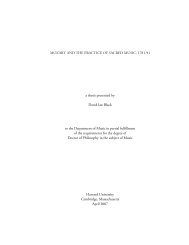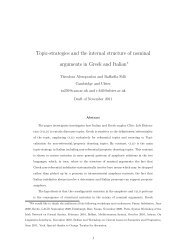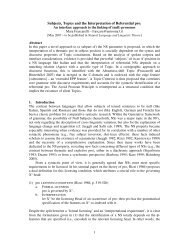Metatheory - University of Cambridge
Metatheory - University of Cambridge
Metatheory - University of Cambridge
You also want an ePaper? Increase the reach of your titles
YUMPU automatically turns print PDFs into web optimized ePapers that Google loves.
6. Completeness 55<br />
It will make our lives easier if we introduce a bit more terminology. Where<br />
Ω are some sentences, say that Ω are jointly polarising iff both: 6<br />
(p1) every sentence among Ω is either an atomic sentence or a negation <strong>of</strong> an<br />
atomic sentence; and<br />
(p2) if a sentence is among Ω, then its negation is not among Ω<br />
Where Ω are jointly polarising, say that A is in the field <strong>of</strong> Ω iff A is an<br />
atomic sentence such that either A or ¬A is among Ω.<br />
It is worth pausing for a moment to think about how this terminology,<br />
and this result, connects with SimpleSearch. When ∆ ⊬ ⊥, SimpleSearch<br />
generates a pro<strong>of</strong>-skeleton with at least one open line. From each open line,<br />
we can read <strong>of</strong>f some jointly polarising sentences, Ω. Moreover, when D is any<br />
sentence among ∆, every atomic subsentence <strong>of</strong> D is in the field <strong>of</strong> Ω. At this<br />
point, we claimed (in the pro<strong>of</strong> <strong>of</strong> Lemma 6.6) that there is bound to be some<br />
valuation that makes all <strong>of</strong> Ω true. That was right, and the more general result<br />
is simply this very easy observation.<br />
Lemma 6.8. Suppose Ω are jointly polarising. Then there is exactly one<br />
valuation <strong>of</strong> the sentences in the field <strong>of</strong> Ω that makes every sentence among<br />
Ω true.<br />
Pro<strong>of</strong>. Define a valuation, v, as follows: for each sentence A in the field <strong>of</strong> Ω,<br />
• v makes A true if A is among Ω<br />
• v makes A false if ¬A is among Ω<br />
Given (p2), v is well-defined. Now, if B is a sentence among Ω, then B is either<br />
A or ¬A, for some sentence A in the field <strong>of</strong> Ω. Either way, v makes B true.<br />
Moreover, any valuation that assigned a different value to A would make B<br />
false. Hence v is unique.<br />
■<br />
Continuing, though, to think through how SimpleSearch relates to this terminology:<br />
the next stage in the pro<strong>of</strong> <strong>of</strong> Lemma 6.6 was for us to show that the<br />
(unique) valuation that makes all <strong>of</strong> Ω true also makes all <strong>of</strong> ∆ true too. This<br />
required a bit <strong>of</strong> work (some <strong>of</strong> which I left as an exercise). But let me now<br />
part company with the pro<strong>of</strong> <strong>of</strong> Lemma 6.6, and instead make a much more<br />
simple observation.<br />
We are considering a situation where all <strong>of</strong> the atomic subsentences <strong>of</strong> some<br />
sentence (in this case, D) are in the field <strong>of</strong> some jointly polarising sentences<br />
(in this case, Ω). We can obtain a very easy and general result about such<br />
situations.<br />
Lemma 6.9. Suppose Ω are jointly polarising and that every atomic subsentence<br />
<strong>of</strong> A is in the field <strong>of</strong> Ω. Then either Ω ⊨ A or Ω ⊨ ¬A.<br />
Pro<strong>of</strong>. Using Lemma 6.8, let v be the unique valuation <strong>of</strong> the sentences in the<br />
field <strong>of</strong> Ω that makes all <strong>of</strong> Ω true . Either v makes A true, or v makes A false.<br />
If v makes A true, then since v is the only valuation that makes all <strong>of</strong> Ω true,<br />
Ω ⊨ A. If v makes A false, then it makes ¬A true, and similar reasoning shows<br />
that Ω ⊨ ¬A.<br />
■<br />
6 NB: this terminology is not standard among logicians.
















